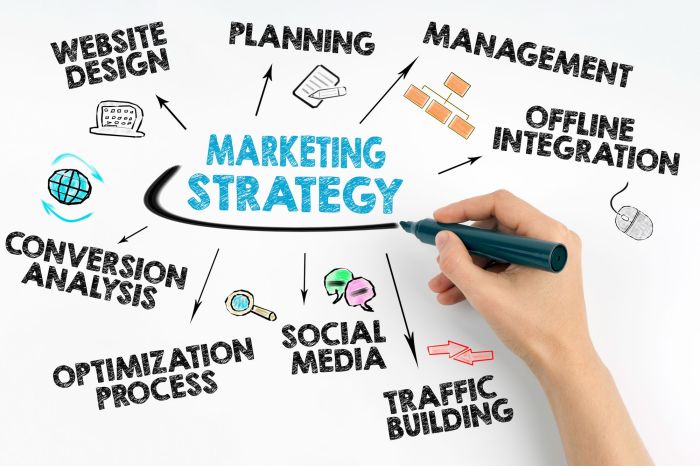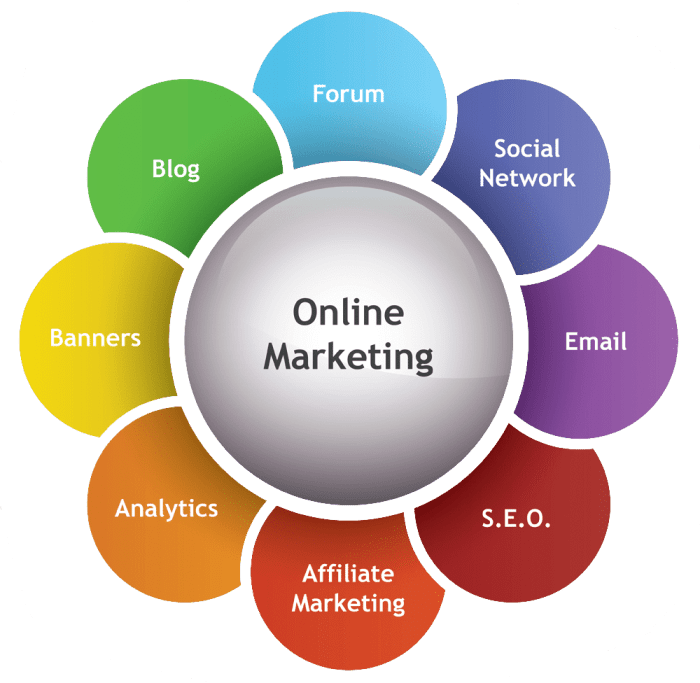Kicking off with Online Business Marketing, this opening paragraph is designed to captivate and engage the readers, setting the tone for a high school hip style that unfolds with each word. In today’s digital age, the online presence of a business is crucial for its success. From creating engaging content to utilizing social media and email marketing, online strategies play a significant role in boosting brand awareness and reaching target audiences effectively.
Let’s dive into the world of online business marketing and explore the key strategies for success.
Importance of Online Business Marketing
Online business marketing is like the bread and butter of a successful business in today’s digital age. With more and more people turning to the internet for shopping, information, and entertainment, having a strong online presence is key to reaching your target audience and staying ahead of the competition.
Examples of Successful Online Marketing Campaigns
- Apple’s “Shot on iPhone” campaign: By encouraging customers to share their own photos taken with iPhones, Apple created a user-generated content campaign that showcased the quality of their camera.
- Dollar Shave Club’s viral video: The humorous and clever video helped the company go viral, resulting in millions of views and a significant increase in sales.
- Oreo’s “Dunk in the Dark” tweet: During the Super Bowl blackout in 2013, Oreo quickly tweeted a clever message that went viral, showcasing the power of real-time marketing.
Impact of Digital Marketing on Brand Awareness
Digital marketing plays a crucial role in boosting brand awareness by reaching a wider audience, engaging with customers on social media, and creating targeted advertising campaigns. By utilizing tools like , social media marketing, email campaigns, and influencer partnerships, businesses can increase their visibility and build a loyal customer base.
Strategies for Effective Online Business Marketing
In the fast-paced world of online business marketing, having the right strategies in place can make all the difference in reaching your target audience and achieving success. Let’s delve into some key strategies that can help you elevate your online marketing game.
Role of and Content Marketing
When it comes to online business promotion, Search Engine Optimization () and content marketing play a crucial role. helps your website rank higher in search engine results, making it easier for potential customers to find you. On the other hand, content marketing involves creating valuable and engaging content that attracts and retains customers. By optimizing your content with relevant s and providing valuable information to your audience, you can boost your online visibility and credibility.
Comparison of Digital Marketing Channels
Digital marketing offers a plethora of channels to promote your business, each with its unique advantages and target audiences. Social media platforms like Facebook, Instagram, and Twitter allow you to engage with your audience in real-time and build a loyal following. Email marketing enables you to reach out to your customers directly with personalized messages and offers. Paid advertising, such as Google Ads or Facebook Ads, can help you target specific demographics and drive traffic to your website.
By utilizing a mix of these digital marketing channels, you can create a comprehensive online marketing strategy that effectively promotes your business to a wider audience.
Creating Engaging Content for Online Marketing
Creating compelling content for online marketing is crucial for capturing the attention of your target audience and driving engagement. One effective way to do this is by incorporating storytelling into your digital marketing efforts. By telling a story, you can create a connection with your audience, evoke emotions, and make your brand more relatable.
Importance of Storytelling in Digital Marketing
Storytelling plays a key role in digital marketing as it helps brands stand out in a crowded online space. By weaving a narrative into your content, you can capture the interest of your audience and keep them engaged. Stories are memorable and can help create a lasting impression of your brand in the minds of consumers.
- Use personal anecdotes or case studies to make your content more relatable.
- Create a consistent brand narrative that runs through all your marketing channels.
- Evoke emotions in your audience by telling stories that resonate with them.
Tips for Optimizing Content for Search Engines, Online Business Marketing
Optimizing your content for search engines is essential to ensure that your target audience can find your website. By following best practices for , you can improve your website’s visibility and attract more organic traffic.
- Use relevant s throughout your content to improve search engine rankings.
- Create high-quality, original content that provides value to your audience.
- Optimize your meta tags, titles, and descriptions to improve click-through rates.
Utilizing Social Media for Business Marketing

In today’s digital age, social media has become an essential tool for businesses to promote their products and services. With millions of users active on platforms like Facebook, Instagram, Twitter, and LinkedIn, businesses can reach a wide audience and increase brand visibility through strategic social media marketing.
Benefits of Using Social Media for Business Promotion
- Increased brand awareness: By maintaining an active presence on social media, businesses can reach a larger audience and increase brand recognition.
- Enhanced customer engagement: Social media provides a platform for businesses to interact with their customers, respond to inquiries, and receive feedback in real-time.
- Cost-effective marketing: Compared to traditional advertising methods, social media marketing is relatively affordable and allows businesses to target specific demographics more effectively.
- Improved website traffic: By sharing engaging content on social media, businesses can drive traffic to their website and boost conversions.
Best Practices for Social Media Marketing
- Define clear goals: Establish specific objectives for your social media marketing efforts, whether it’s increasing brand awareness, driving sales, or promoting new products.
- Consistent branding: Maintain a cohesive brand identity across all social media platforms to ensure brand recognition and credibility.
- Create engaging content: Share a mix of visuals, videos, articles, and interactive posts to keep your audience interested and encourage interaction.
- Utilize data analytics: Use social media analytics tools to track performance, understand audience behavior, and make data-driven decisions for future campaigns.
Importance of Engaging with the Audience on Social Platforms
Engaging with your audience on social media is crucial for building relationships, gaining customer loyalty, and fostering brand advocacy. By responding to comments, messages, and reviews promptly, businesses can show their commitment to customer satisfaction and create a positive brand image.
Email Marketing Strategies for Online Businesses: Online Business Marketing
Email marketing is a powerful tool for online businesses to reach their target audiences directly. It allows businesses to communicate with their customers in a personalized way, leading to increased engagement and conversions. Let’s dive into some effective strategies for successful email marketing campaigns.
Building an Email List
Building a quality email list is essential for successful email marketing campaigns. Here are some tips to help you grow your email list:
- Create compelling opt-in forms on your website to capture visitors’ email addresses.
- Offer valuable incentives such as discounts or free resources in exchange for email sign-ups.
- Promote your email newsletter on social media platforms to attract a wider audience.
Increasing Open Rates
Increasing open rates is crucial for the success of your email marketing campaigns. Here are some tips to improve your open rates:
- Write attention-grabbing subject lines that entice recipients to open your emails.
- Personalize your emails by addressing recipients by their name to make them feel valued.
- Segment your email list based on demographics and past interactions to send targeted content.
Successful Email Marketing Campaign Examples
Some successful email marketing campaigns include:
- The Welcome Series by Airbnb, which introduces new users to the platform and encourages them to book their first stay.
- The Birthday Email by Sephora, which offers customers a special birthday gift and personalized recommendations based on their purchase history.
- The Abandoned Cart Email by Amazon, which reminds customers of the items left in their cart and encourages them to complete their purchase.
Analyzing Online Marketing Metrics

Online marketing metrics are crucial for businesses to understand the effectiveness of their digital marketing efforts. By tracking and analyzing these metrics, companies can make informed decisions to optimize their online marketing strategies and improve overall performance.
Key Performance Indicators (KPIs) for Measuring Digital Marketing Success
- Conversion Rate: This metric measures the percentage of website visitors who take a desired action, such as making a purchase or filling out a form. A high conversion rate indicates that the marketing campaign is resonating with the target audience.
- Website Traffic: Monitoring website traffic helps businesses understand how many visitors are coming to their site, where they are coming from, and which pages they are interacting with the most.
- ROI (Return on Investment): Calculating the return on investment helps businesses determine the profitability of their marketing campaigns. It compares the amount spent on marketing to the revenue generated as a result.
- Click-Through Rate (CTR): CTR measures the percentage of people who click on a specific link compared to the total number of impressions. A high CTR indicates that the marketing message is compelling and engaging.
Tools and Techniques for Monitoring Marketing Performance
- Google Analytics: This free tool provides valuable insights into website traffic, user behavior, and conversion rates. Businesses can track key metrics and set up custom reports to monitor performance.
- Social Media Analytics: Platforms like Facebook Insights, Twitter Analytics, and LinkedIn Analytics offer data on engagement, reach, and demographics. Businesses can use this information to optimize their social media marketing strategies.
- Email Marketing Platforms: Tools like MailChimp and Constant Contact provide detailed reports on email open rates, click-through rates, and conversion rates. Businesses can use this data to refine their email marketing campaigns for better results.
